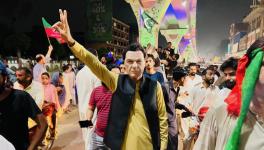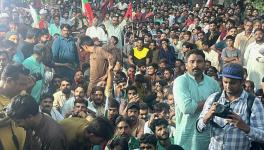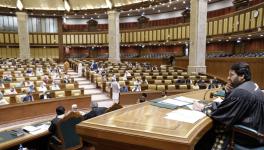Why it is difficult for Sidhu to become Punjab’s Imran Khan
Former Test cricketer Imran Khan launched the Pakistan Tehreek-e-Insaf, or Pakistan Movement for Justice, in 1996, as a vehicle for realising his political ambition. Khan contested from two constituencies in the 1997 elections to the National Assembly, Pakistan’s equivalent to India’s Lok Sabha.
He lost in both. Five years later, in 2002, he was the only candidate from the Tehreek-e-Insaf to enter the National Assembly. Until 2011, it seemed Khan was doomed to be a bit player in Pakistani politics, let alone become the prime minister of his country.
In those years of struggle, Khan’s then-wife, Jemima, would often despair over his repeated failures in politics. Jemima “used to ask me how long I would keep pursuing politics without succeeding, at what point would I decide it was futile. But I couldn’t answer, simply because a dream has no time-frame,” Khan wrote in his book, Pakistan: A Personal History.
Khan’s story has two important lessons for former Indian cricketer and Congress leader, Navjot Singh Sidhu, who has chosen to raise the pitch of his rebellion against Punjab Chief Minister Captain Amarinder Singh. One, a dreamer claiming he wants to change the system must have his own political party. Two, even a famous cricketer wishing to be more than an MLA or MP or minister requires to persevere for long, lonely years to persuade people of his ability to transform the system and govern.
Sidhu is Punjab’s Imran Khan. Or he, at least, wants to be.
Sidhu is not a national cricketing icon as, say, Khan was to Pakistan or Sachin Tendulkar is to India. Yet Sidhu has multiple meanings for Punjab. Once dubbed as a strokeless wonder, he worked hard on his batting to master the art of hitting sixes. His transformation coincided with the rapid expansion of cable television in India and the growing popularity of One-Day cricket. Sidhu’s following grew.
Punjab took pride in Sidhu’s success, more so as it had been torn by militancy. Sidhu represented normalcy. He was also an argument against all those who suspected the Sikh community’s loyalty to India. After Sidhu retired from international cricket in 1999, he became a popular cricket commentator, with his trademark Sidhuism or one-liners. Thereafter, he became a permanent participant in comedy shows, at times guffawing for reasons none could fathom.
In 2004, he was elected to the Lok Sabha on the Bharatiya Janata Party ticket from Amritsar, a feat he repeated in 2009, even though his victory margin shrunk. Yet, in those years, Sidhu did not quite grab media headlines as a politician. In 2014, the Amritsar Lok Sabha constituency was taken away from Sidhu and assigned to Arun Jaitley, who failed to win from there. Sidhu sulked.
To assuage and dissuade him from leaving the party, the BJP, in 2016, brought him to the Rajya Sabha, from where he resigned months later. There were speculations he would join the Aam Aadmi Party, then riding the crest of a popularity wave in Punjab, but it was to the Congress he went.
Sidhu campaigned across the state and, as is evident from the many interviews over the last few days, he thought the victory of the Congress in the 2017 Assembly elections was largely due to him. Chief Minister Capt. Amarinder Singh made Sidhu a minister, but it is said he wanted the post of Deputy Chief Minister. That post would have anointed him as the future chief minister. In a ministerial reshuffle in 2019, Sidhu’s portfolios were changed. Stung, he resigned from Singh’s ministry.
A rebel was born, albeit a silent one.
But, over the last few days, Sidhu has been railing against what he calls a corrupt system. He says he wants to resurrect Punjab’s lost glory. He wants to break the mafia’s stranglehold over politics. He says he does not hanker after a post, and that his only agenda is Punjab’s welfare.
This is precisely what leaders with ambition often claim before they mount a challenge to the existing leadership.
Sidhu’s rhetoric, quite remarkably, echoes Khan’s. In April 1995, a good year before he formed his own party, Khan said, “The assumption that I want to be Prime Minister is complete nonsense. I don’t want to get mixed up with politics.” A month later, Khan said, “Politicians are corrupt to the core. They have devoured the wealth of this nation and are thirsting for more.”
Sidhu is realistic enough to know he cannot make the national arena his political playground. His turf is Punjab, where, like the populist Khan, he hopes to catch the popular imagination with his diatribes against the venal system. Khan had the foresight to figure out that his attacks on the system would lack credibility if he were to join one of Pakistan’s mainstream political parties. It is for this reason he floated the Tehreek-e-Insaf.
For a person who has been either in the BJP or the Congress, it seems incredible Sidhu should take on the menace of corruption so vociferously so late in his political career. History tells us that anti-corruption crusaders leave the party to which they belong—or are ousted from it. Think VP Singh, who raised the Bofors issue in the 1980s and was, not surprisingly, shown the door.
It is possible Sidhu thinks he can do an Imran Khan in Punjab. Khan was 44 years old when he founded the Tehreek-e-Insaf. It took him another 22 years to become the Prime Minister of Pakistan. More significantly, Khan demonstrated to the world that he had the zeal to realise his goals outside the cricket field.
For instance, at his mother’s death in 1986, Khan resolved to build a state-of-art cancer hospital. He crisscrossed the country to raise funds for the cancer hospital. Money poured in as he skippered Pakistan to win the World Cup in 1992. He inspired schoolchildren, who considered him a demigod, to join his campaign to build the hospital. In 1994, the Shaukat Khanum Memorial Cancer Hospital & Research Centre, named after Khan’s mother, came up in Lahore. It now has a branch in Peshawar. In 2021, the trust running the two hospitals had a budget of Rs 19 billion, and has, since its inception, spent Rs 53 billion on the philanthropic treatment of patients.
In 1995, Khan was quoted saying, “Right now, Pakistanis are looking for a saviour. Just because I’ve built a hospital and led Pakistan to a World Cup win, they think I’m the one. It shows how desperate people are.” And yet, it took Pakistanis two decades to believe Khan could be their saviour, perhaps persuaded by another feat of his—a technical college he built in Mianwali district.
By contrast, since his retirement, Sidhu has mostly commented on cricket and sat through TV comedies, tickling the nation. And though popularly perceived as an honest politician, his activities have not conveyed to the people that he has it in him to transform the system on his own. His preferred strategy, if it can even be called that, is to take the reins of the Congress in Punjab and lead to what has been an age-old dream—an India free of corruption.
Why would Capt. Amarinder Singh or other factional leaders give Sidhu a free pass, more so as he has been in the party for four years? Why would they listen to a man who has yet to prove he could be the difference between the Congress losing and winning an election?
Khan did not harbour the illusion that political parties would listen to him. In fact, until 2011, Khan was considered a wannabe politician. In that year, he held a massive rally in Lahore and emerged as a possible political force in Pakistan. He fused, rather depressingly, religious rhetoric with an anti-America stance to widen his base. In 2013, the PTI emerged as the second biggest party by vote. In 2018, he became the prime minister, although, it is said, with more than a little help from the Pakistan Army.
It is still possible Sidhu will prove his critics wrong. For instance, he could float his own outfit and wage a long battle for Punjab’s soul. But he has to be prepared for setbacks. With the Assembly elections about eight months away, it is difficult for a political fledgling to grow wings and soar. Does he have the patience and grit to realise a dream that has, to use Khan’s phrase, “no time-frame”?
For a person to the manor born, to whom cricket brought political and monetary gains rather easily, it just might be difficult for Sidhu to court oblivion, to walk from village to village to mobilise people, to jump into the rough and tumble of agitations. Sidhu laboured hard for four years to transform his batting style, from being a strokeless wonder to becoming a Palmgrove hitter. Politics, too, demands nothing less.
The author is an independent journalist. The views are personal.
Get the latest reports & analysis with people's perspective on Protests, movements & deep analytical videos, discussions of the current affairs in your Telegram app. Subscribe to NewsClick's Telegram channel & get Real-Time updates on stories, as they get published on our website.
























